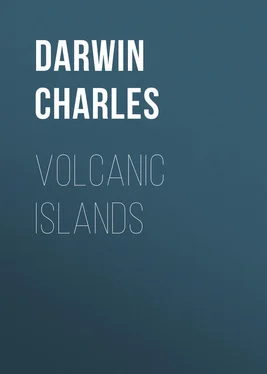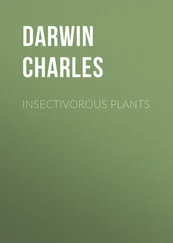Charles Darwin - Volcanic Islands
Здесь есть возможность читать онлайн «Charles Darwin - Volcanic Islands» — ознакомительный отрывок электронной книги совершенно бесплатно, а после прочтения отрывка купить полную версию. В некоторых случаях можно слушать аудио, скачать через торрент в формате fb2 и присутствует краткое содержание. Жанр: foreign_antique, foreign_prose, на английском языке. Описание произведения, (предисловие) а так же отзывы посетителей доступны на портале библиотеки ЛибКат.
- Название:Volcanic Islands
- Автор:
- Жанр:
- Год:неизвестен
- ISBN:нет данных
- Рейтинг книги:5 / 5. Голосов: 1
-
Избранное:Добавить в избранное
- Отзывы:
-
Ваша оценка:
- 100
- 1
- 2
- 3
- 4
- 5
Volcanic Islands: краткое содержание, описание и аннотация
Предлагаем к чтению аннотацию, описание, краткое содержание или предисловие (зависит от того, что написал сам автор книги «Volcanic Islands»). Если вы не нашли необходимую информацию о книге — напишите в комментариях, мы постараемся отыскать её.
Volcanic Islands — читать онлайн ознакомительный отрывок
Ниже представлен текст книги, разбитый по страницам. Система сохранения места последней прочитанной страницы, позволяет с удобством читать онлайн бесплатно книгу «Volcanic Islands», без необходимости каждый раз заново искать на чём Вы остановились. Поставьте закладку, и сможете в любой момент перейти на страницу, на которой закончили чтение.
Интервал:
Закладка:
Charles Darwin
Volcanic Islands
CRITICAL INTRODUCTION
The preparation of the series of works published under the general title "Geology of the Voyage of the 'Beagle'" occupied a great part of Darwin's time during the ten years that followed his return to England. The second volume of the series, entitled "Geological Observations on Volcanic Islands, with Brief Notices on the Geology of Australia and the Cape of Good Hope," made its appearance in 1844. The materials for this volume were collected in part during the outward voyage, when the "Beagle" called at St. Jago in the Cape de Verde Islands, and St. Paul's Rocks, and at Fernando Noronha, but mainly during the homeward cruise; then it was that the Galapagos Islands were surveyed, the Low Archipelago passed through, and Tahiti visited; after making calls at the Bay of Islands, in New Zealand, and also at Sydney, Hobart Town and King George's Sound in Australia, the "Beagle" sailed across the Indian Ocean to the little group of the Keeling or Cocos Islands, which Darwin has rendered famous by his observations, and thence to Mauritius; calling at the Cape of Good Hope on her way, the ship then proceeded successively to St. Helena and Ascension, and revisited the Cape de Verde Islands before finally reaching England.
Although Darwin was thus able to gratify his curiosity by visits to a great number of very interesting volcanic districts, the voyage opened for him with a bitter disappointment. He had been reading Humboldt's "Personal Narrative" during his last year's residence in Cambridge, and had copied out from it long passages about Teneriffe. He was actually making inquiries as to the best means of visiting that island, when the offer was made to him to accompany Captain Fitzroy in the "Beagle. " His friend Henslow too, on parting with him, had given him the advice to procure and read the recently published first volume of the "Principles of Geology," though he warned him against accepting the views advocated by its author. During the time the "Beagle" was beating backwards and forwards when the voyage commenced, Darwin, although hardly ever able to leave his berth, was employing all the opportunities which the terrible sea-sickness left him, in studying Humboldt and Lyell. We may therefore form an idea of his feelings when, on the ship reaching Santa Cruz, and the Peak of Teneriffe making its appearance among the clouds, they were suddenly informed that an outbreak of cholera would prevent any landing!
Ample compensation for this disappointment was found, however, when the ship reached Porta Praya in St. Jago, the largest of the Cape de Verde Islands. Here he spent three most delightful weeks, and really commenced his work as a geologist and naturalist. Writing to his father he says, "Geologising in a volcanic country is most delightful; besides the interest attached to itself, it leads you into most beautiful and retired spots. Nobody but a person fond of Natural History can imagine the pleasure of strolling under cocoa-nuts in a thicket of bananas and coffee-plants, and an endless number of wild flowers. And this island, that has given me so much instruction and delight, is reckoned the most uninteresting place that we perhaps shall touch at during our voyage. It certainly is generally very barren, but the valleys are more exquisitely beautiful, from the very contrast. It is utterly useless to say anything about the scenery; it would be as profitable to explain to a blind man colours, as to a person who has not been out of Europe, the total dissimilarity of a tropical view. Whenever I enjoy anything, I always look forward to writing it down, either in my log-book (which increases in bulk), or in a letter; so you must excuse raptures, and those raptures badly expressed. I find my collections are increasing wonderfully, and from Rio I think I shall be obliged to send a cargo home."
The indelible impression made on Darwin's mind by this first visit to a volcanic island, is borne witness to by a remarkable passage in the "Autobiography" written by him in 1876. "The geology of St. Jago is very striking, yet simple; a stream of lava formerly flowed over the bed of the sea, formed of triturated recent shells and corals, which it has baked into a hard white rock. Since then the whole island has been upheaved. But the line of white rock revealed to me a new and important fact, namely that there had been afterwards subsidence round the craters which had since been in action, and had poured forth lava. It then first dawned on me that I might perhaps write a book on the geology of the various countries visited, and this made me thrill with delight. That was a memorable hour to me, and how distinctly I can call to mind the low cliff of lava beneath which I rested, with the sun glaring hot, a few strange desert plants growing near and with living corals in the tidal pools at my feet."
Only five years before, when listening to poor Professor Jameson's lectures on the effete Wernerianism, which at that time did duty for geological teaching, Darwin had found them "incredibly dull," and he declared that "the sole effect they produced on me was a determination never so long as I lived to read a book on Geology, or in any way to study the science."
What a contrast we find in the expressions which he makes use of in referring to Geological Science, in his letters written home from the "Beagle!" After alluding to the delight of collecting and studying marine animals, he exclaims, "But Geology carries the day!" Writing to Henslow he says, "I am quite charmed with Geology, but, like the wise animal between two bundles of hay, I do not know which to like best; the old crystalline group of rocks, or the softer and more fossiliferous beds." And just as the long voyage is about to come to a close he again writes, "I find in Geology a never-failing interest; as it has been remarked, it creates the same grand ideas respecting this world which Astronomy does for the Universe." In this passage Darwin doubtless refers to a remark of Sir John Herschel's in his admirable "Preliminary Discourse on the Study of Natural Philosophy," – a book which exercised a most remarkable and beneficial influence on the mind of the young naturalist.
If there cannot be any doubt as to the strong predilection in Darwin's mind for geological studies, both during and after the memorable voyage, there is equally little difficulty in perceiving the school of geological thought which, in spite of the warnings of Sedgwick and Henslow, had obtained complete ascendancy over his mind. He writes in 1876: "The very first place which I examined, namely St. Jago in the Cape de Verde Islands, showed me clearly the wonderful superiority of Lyell's manner of treating Geology, compared with that of any other author, whose works I had with me, or ever afterwards read." And again, "The science of Geology is enormously indebted to Lyell – more so, as I believe, than to any other man who ever lived…I am proud to remember that the first place, namely, St. Jago, in the Cape de Verde Archipelago, in which I geologised, convinced me of the infinite superiority of Lyell's views over those advocated in any other work known to me."
The passages I have cited will serve to show the spirit in which Darwin entered upon his geological studies, and the perusal of the following pages will furnish abundant proofs of the enthusiasm, acumen, and caution with which his researches were pursued.
Large collections of rocks and minerals were made by Darwin during his researches, and sent home to Cambridge, to be kept under the care of his faithful friend Henslow. After visiting his relations and friends, Darwin's first care on his return to England was to unpack and examine these collections. He accordingly, at the end of 1836, took lodgings for three months in Fitzwilliam Street, Cambridge, so as to be near Henslow; and in studying and determining his geological specimens received much valuable aid from the eminent crystallographer and mineralogist, Professor William Hallows Miller.
Читать дальшеИнтервал:
Закладка:
Похожие книги на «Volcanic Islands»
Представляем Вашему вниманию похожие книги на «Volcanic Islands» списком для выбора. Мы отобрали схожую по названию и смыслу литературу в надежде предоставить читателям больше вариантов отыскать новые, интересные, ещё непрочитанные произведения.
Обсуждение, отзывы о книге «Volcanic Islands» и просто собственные мнения читателей. Оставьте ваши комментарии, напишите, что Вы думаете о произведении, его смысле или главных героях. Укажите что конкретно понравилось, а что нет, и почему Вы так считаете.












